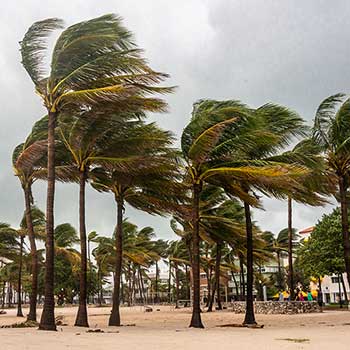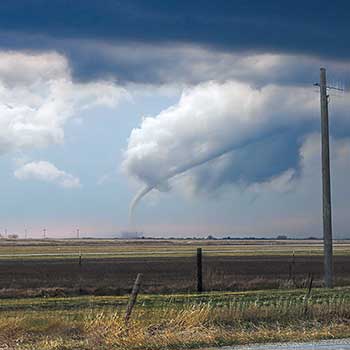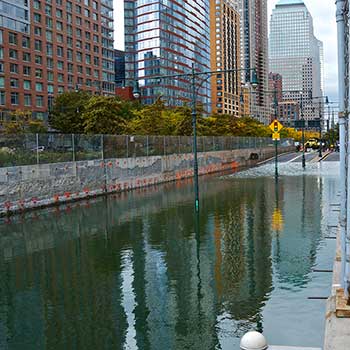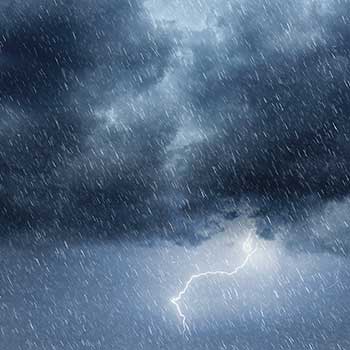Property Damage Claims: What to Know, What to Do and What to Expect
What is covered under my policy?
A standard homeowners’ insurance policy generally covers the physical structure of your home, including attached structures, and may include detached structures like fences and sheds. It also typically includes personal property coverage for belongings damaged or stolen in a covered event, additional living expenses if your home becomes uninhabitable due to covered damage, and liability protection if you are responsible for injuries or property damage to others. However, certain risks are not covered under a standard policy. Flood and storm surge damage is usually excluded, requiring you to have a separate flood insurance policy. Windstorm and hurricane coverage varies by location and policy, and some property owners may need a separate windstorm policy. To understand your specific coverage, review your policy’s Declarations page and read the full policy document.
What can I claim under my policy?
Benefits vary by policy and very often by industry; see your policy’s Declaration page, along with all policy forms and the exhibits, if any, to your policy, to determine the scope of your coverage. The following are some of the losses you may be eligible to claim. Consulting with industry experts—such as the experienced Property Claim Attorneys at the Insurance Litigation Group—can help identify additional benefits that may be available under your policy.
- Property damage coverage, for the dwelling or insured buildings. There might also be coverage for Other Structures not attached to the dwelling.
- Contents or personal property that was damaged by a covered loss, which could include inventory losses under a commercial policy.
- Additional Living Expenses or Loss of Use.
- Law & Ordinance costs, should repairs to damaged property require municipal code updates.
- Business Interruption, which could include lost revenue based on prior records, employee payroll, temporary relocation costs, fixed operating expenses, and extra expenses incurred to resume operations.
- Spoiled inventory, such as perishable food, pharmaceuticals, and temperature-sensitive products.
What measures should I take after my property has been damaged?
After your property has been damaged, take the following steps to protect your home, document the damage, and begin the claims process:
- Ensure Safety First – If the damage poses an immediate danger (such as structural instability, fire, or flooding), evacuate and contact emergency services, if necessary.
- Prevent Further Damage – Take reasonable steps to mitigate additional damage, such as covering broken windows, tarping a damaged roof, or shutting off utilities, if needed. If necessary, bring in experienced clean up and mold remediation professionals. Most policies require homeowners to prevent further damage, when possible.
- Document the Damage – Take detailed photos and videos of all affected areas, including damaged property, structural issues, and any belongings impacted. Keep records of all damaged or lost items.
- Notify Your Insurance Company – Contact your insurer as soon as possible to report the damage and initiate a claim. Provide the necessary details and follow their instructions on the next steps. Alternatively, when you are ready to begin your insurance claim process and need help filing your claim with your insurance company, the Property Claim Attorneys at the Insurance Litigation Group can be with you from the very start and will process and report your property damage claim on your behalf.
- Keep Records of Expenses – Save receipts for temporary repairs, hotel stays, meals, and other out-of-pocket costs related to the damage, as your policy may cover these under additional living expenses (ALE).
- Avoid Permanent Repairs Until Approved – Do not make major or permanent repairs until your insurer assesses the damage and provides authorization, as this could impact your claim. DO NOT DISCARD ANY DAMAGED PORTION OF THE HOUSE BEFORE THE INSURANCE COMPANY HAS HAD A CHANCE TO INSPECT IT. SET THE DAMAGED ITEM ASIDE FOR THE ADJUSTER TO VIEW.
- Work with the Insurance Adjuster – Cooperate with the insurance company’s adjuster by providing requested documents, answering questions, and ensuring they can inspect the damage. Make sure to keep copies of ALL correspondence with your insurance company, in case there’s a dispute on coverage, scope, or amount of damages to bring your property back to its pre-loss condition.
- Consider Professional Help before or after you file your claim– If you’re having difficulty filing your claim, or if your claim is complex or if you face issues with your insurer, consult a public adjuster or an attorney, like the Property Claim Attorneys at Insurance Litigation Group, to help protect your rights and ensure a fair settlement.
Do I have a Deductible and how does that work?
Most, if not all, homeowner’s insurance policies will have some sort of deducible. The deductible is a predetermined flat dollar amount that you are responsible to pay before the insurance company will pay you anything on your claim. For example, if your home suffers roof damage in the amount of $25,000.00 and your policy has a $3,000.00 deductible; then your insurance carrier should pay you $22,000.00.
A hurricane deductible is separate from your primary home insurance deductible and is a percentage of your home’s insured value (the total policy Coverage “A” limit). This coverage “A” number is generally found on your Insurance Policy Declaration Page (Dec Page). These deductibles are typically between 1% and 5% of the home’s insured value. Example: If your Coverage “A” Limit is $200,000 and your Deductible Percentage is 2%, your deductible Amount is $4,000 (out of pocket expense on the claim).
What evidence do I need to support my property damage claim?
Photos (before and after the damage), videos, maintenance records, repair estimates, and correspondence with your insurer all help to strengthen your claim.
Should I file a claim with my insurance Company myself or have an attorney file the claim?
Before you file your damage claim directly with your insurance company, it is best to discuss your case with a knowledgeable property damage claims attorney first. In general, insurance companies look to either delay, deny or pay the least amount of money possible for claims. Having a law firm navigate your claim from the beginning and letting them file your claim on your behalf can significantly benefit your claim’s outcome.
The Property Claim Specialists and Attorneys at ILG are deeply knowledgeable in how to interpret the language in insurance policies and how to navigate the claim process. From the moment we file your claim, we will fight to make sure that the insurance company fulfills their obligations under your insurance policy.
However, if you wish to contact your insurance company directly and file your claim on your own, be careful, as the information provided to your carrier can be used to either deny your claim or make a low-ball offer.
What is an Insurance Litigation Group (ILG) Retainer Packet?
The ILG retainer packet is a document that outlines the fees and costs of the services ILG will provide in the scope of our representation. To expedite your claim. this packet also gives us the authorization to contact your insurance company and mortgage company, if applicable, on your behalf, regarding your claim.
After I sign the retainer, what are the next steps?
- If you have not yet filed your claim, our experienced Claim Specialists will start the process by filing your property damage claim on your behalf, with your insurance company. If a claim was previously filed with your insurance company, we will review your insurance policy and other claim related documents to implement a legal strategy and action plan to help get you paid.
- The next step is to have an ILG Loss Assessment Specialist visit your property. The Loss Assessment Specialist will assess the damages, take measurements to write an estimate to present to the insurance company in order to obtain maximum pay out for your claim.
- If needed, we will send out a 3D Photographer that will come out to take detailed pictures of the damage. These pictures will give your Insurance Company the effect of standing in your home in real life.
- If you have not yet filed a claim against the insurance, we will file your claim with the insurance company and will obtain a claim number.
Who determines the “value” of my property damage claim?
The ILG Loss Assessment Specialist will prepare its own independent estimate and submit that estimate to your insurance company. Your insurance company will also send someone out to do their own estimate of the loss. If the amounts or items on both estimates are not the same, which is often the case, then an attempt will be made to resolve the estimation of the damage without legal action. Most disputes in the insurance context are over the value of the property damage. Therefore, it is imperative to have a team like ILG advocate and fight for your rights! The insurance companies have experts and attorneys on their side – you should too!
How long of a wait before the insurance company acknowledges my damage claim?
Under Florida law, for example, the insurance carriers must acknowledge and act upon communications with respect to claims within 7 calendar days. They must begin their investigation within 7 working days of receipt of proof of loss statements and they must provide a written statement confirming that the claim is being investigated, and they have 30 days from the receipt of the proof of loss to conduct any such physical inspections, if such investigation requires a physical inspection of the damage. The claim – or undisputed portion of the claim – must be paid within 60 days. Other states may follow similar timelines controlled by statute or by timing limitations written into the policy.
After a hurricane or other natural disaster, based on our experience with Hurricanes Katrina, Wilma, Irma, Michael, Sally, Ian, Helene, and Milton, it took many months to years for many property owners to receive payouts. Partly because there were too few adjusters with the needed expertise and the insurance companies were simply not prepared to manage the volume of claims. At ILG, our goal is to proactively keep the pressure on the insurance company to send an adjuster as soon as possible so that a determination can be made regarding your damage and then to aggressively obtain the maximum settlement from your insurance company.
What happens after you receive an offer from my insurance company?
When we receive an offer, if there is any, we will relay the offer to you. In a perfect world, your insurance company will make a fair offer. But more often than not, this simply isn’t the case. If you feel the payout being offered is too low, we will either negotiate a more favorable settlement for you or push your claim further including filing a lawsuit against the insurance company on your behalf and going to trial if they don’t pay.
What happens if my claim is delayed, denied, or partially denied?
Don’t be surprised if the insurance company’s first reaction is to act in Bad Faith, by delaying the processing of your claim or not properly investigating your claim, or asserting that your damage is due to some pre-existing condition, or that your claim is not covered under the terms of your policy, or even cancelling your policy based on recently discovered “errors” in your application.
If your claim is delayed, denied, partially denied, or underpaid, we will look into the reasons. If our experienced and aggressive Property Claim Attorneys feel that the insurance company is wrongfully delaying or denying your claim, our attorneys will continue to advocate on your behalf and litigate as necessary to help you get the benefits to which you are entitled.
What happens if the insurance company only wants to pay me for portion of my claim? Do I have other recourse against the insurance company?
Yes! If your claim is underpaid or partially paid, our aggressive and experienced Property Clain Attorneys will fight on your behalf to help get you paid what the insurance company really owes you.
Can I still fight my insurance company if I have already received a payment but believe it is too low to cover my damage?
Yes! Accepting an initial low-ball payment, which does not fully cover your losses, does not necessarily mean you forfeit your right to seek additional compensation, assuming you did not sign a release. Even if you were paid, you may still be owed more money under your policy and our aggressive and experienced Property Claim Attorneys will fight on your behalf to help get you paid for what the insurance company really owes you.
What if I find additional damage while making repairs?
If you find additional damage while repairs are underway, you can file a supplemental claim for those additional costs. Once repairs are made, you can submit the receipts and invoices. If the insurance company is undervaluing the cost to repair covered damages, or if they disagree on the scope of the damage as to what items should be repaired, ILG will fight on your behalf to help get you paid what the insurance company really owes you.
Should I Sign a Release?
NO! Once you sign your release, you will waive any and all future payments from the insurance company, regardless of what would have been covered, because you are waving any right to future payments related to that claim. The insurance company should issue an undisputed payment for the damage that they agree with, without strings attached. Meaning the insurance company should not require you to sign a release in order to obtain that payment.
If your insurance company does require a release, you should never sign a release on your claim, until you know exactly what needs to be repaired and the costs associated with all mitigation, remediation, and repair efforts, and unless you have an attorney first review and approve the release. The Property Claim Attorneys at ILG are very familiar at looking at insurance policies, payments and releases. ILG will review the release and let you know that it is acceptable to sign, or if it is not in your best interest to sign and if you should litigate the issue.
What are common tactics insurance companies use to delay or deny claims?
Delayed inspections, excessive documentation requests, misinterpreting policy language, and alleging wear and tear or pre-existing damage are common tactics used to avoid full payouts. Insurance companies like to also claim that your damage is under your deductible and therefore they do not owe you any money.
Will hiring an attorney increase my chances of getting a fair settlement?
Yes! Experienced property insurance attorneys know how to challenge insurers, navigate the complex claim process, negotiate better settlements, and, if necessary, take legal action to ensure policyholders receive the compensation they are entitled to.
How much is it to hire an insurance litigation attorney?
Many firms, including ours, work on a contingency fee basis, meaning you pay no fees unless we win your case.
Is hiring The Insurance Litigation Group necessary?
YES!!! The insurance company has their experts & attorneys; your representation should be no different! You, too, should be represented by experienced attorneys. ILG is a top-notch property insurance litigation law firm. Our diverse multi-lingual team consisting of Property Claim Attorneys, Loss Assessment Specialists, Paralegals, Legal Assistants, Client Satisfaction Champions as well as former public adjusters, have all the legal means and tools at their disposal to pressure the insurance company, including engaging in litigation and going to trial, as necessary. Public adjusters are fully aware of what they can and cannot do, and when they are unable to achieve what they know to be a full and fair resolution, they will refer the insurance claim to us to handle. Our experienced litigation team does not take “no” for an answer. We have recovered tens of millions for our clients.
WE WILL FIGHT TO GET YOU PAID! Let us help you recover what you are owed under your policy. All it takes is one call to ILG, to receive a thorough, no-cost inspections to identify damage, visible or hidden.
DON’T WORRY! Our experienced and aggressive Property Claim Attorneys are on your side throughout the entire process, committed to giving you the peace of mind you deserve.
DO NOT LET THE INSURANCE COMPANY HAVE THE LAST WORD!
To schedule your FREE property inspection or for assistance with your claim, contact us at 888-454-4254 or info@ilgpa.com. Let our combined 75+ years of property damage insurance claim experience work for you.
What Our Clients Say
Our Offices
We are a client-focused law firm that fights aggressively on behalf of residential and commercial policyholders, contractors, restoration and mitigation companies, to produce maximum recovery results from insurance companies through our unique expertise, deep understanding of insurance law, cutting edge technology and proactive approach to litigation.
Insurance Litigation Group serves clients across multiple states with Florida being our principal office. Our attorneys have the knowledge, skills and experience to resolve your dispute against the insurance company.

Florida

Iowa*

Kansas*

New York*

Tenn.*

Wisc.*
Work with local counsel in these locations*